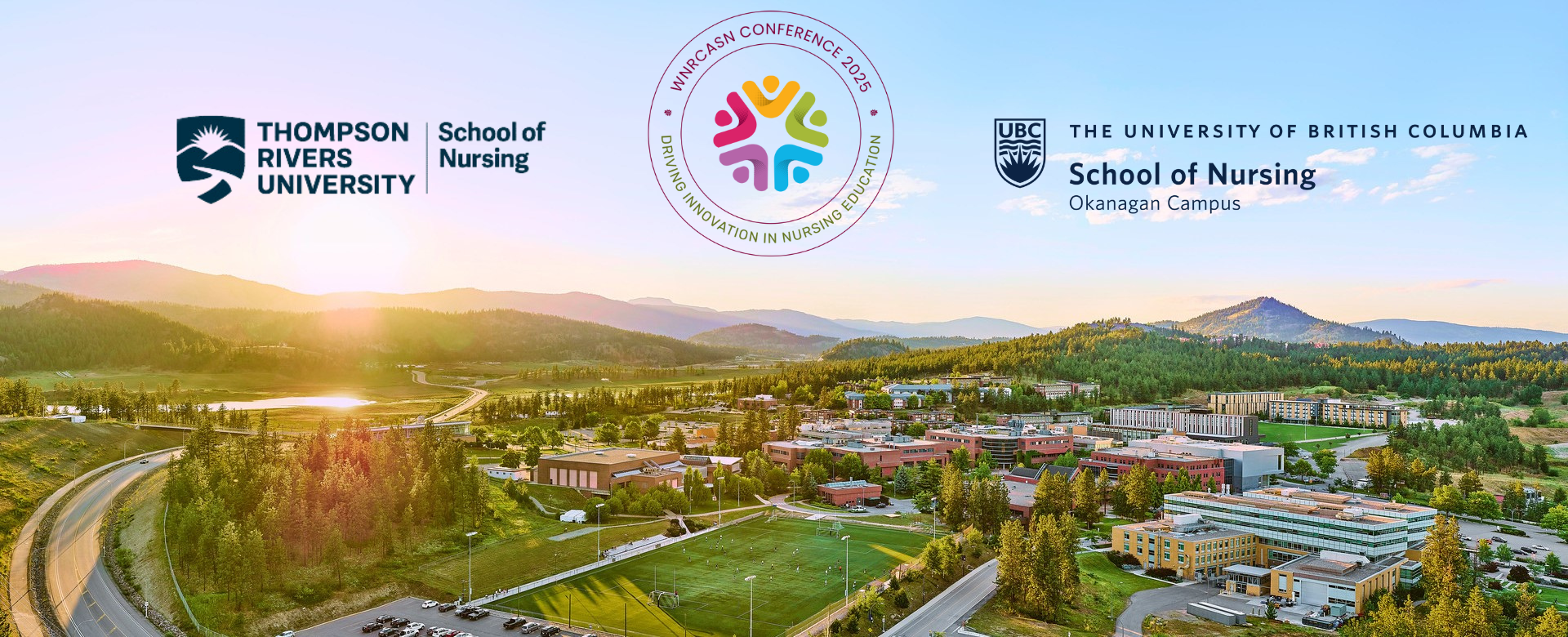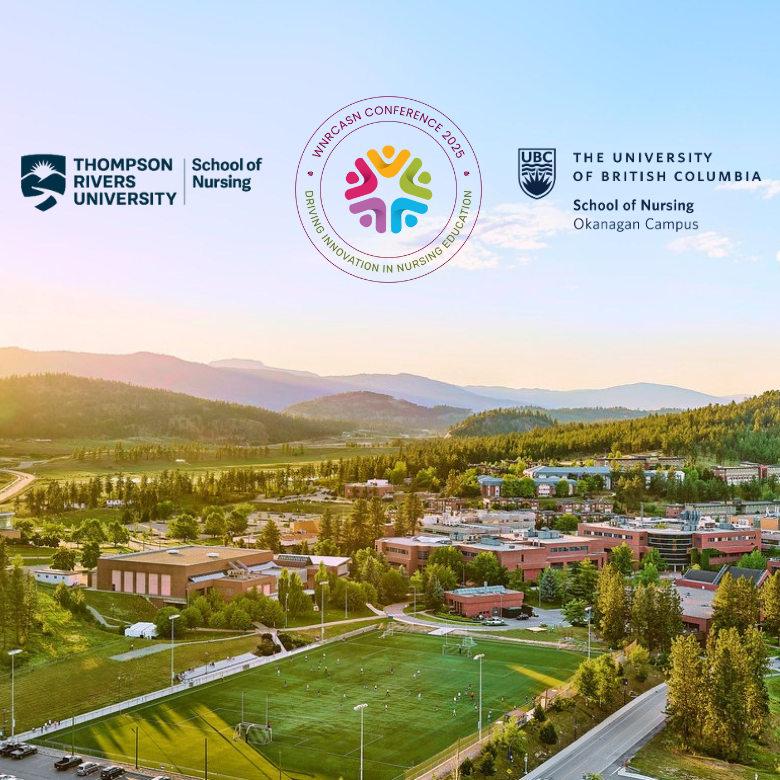About WNRCASN
WNRCASN is an organization of individual faculty members of CASN-affiliated schools of nursing in Western Canada. It was founded in 1969 to provide a forum for members’ expressions of beliefs, ideas, and concerns regarding nursing and nursing education and is the only forum in Western Canada devoted to address the concerns of nursing educators.
WNRCASN includes the four Western Provinces and one Territory: Manitoba, Saskatchewan, Alberta, British Columbia, and the Northwest Territories.
Learn more at wnrcasn.ca.
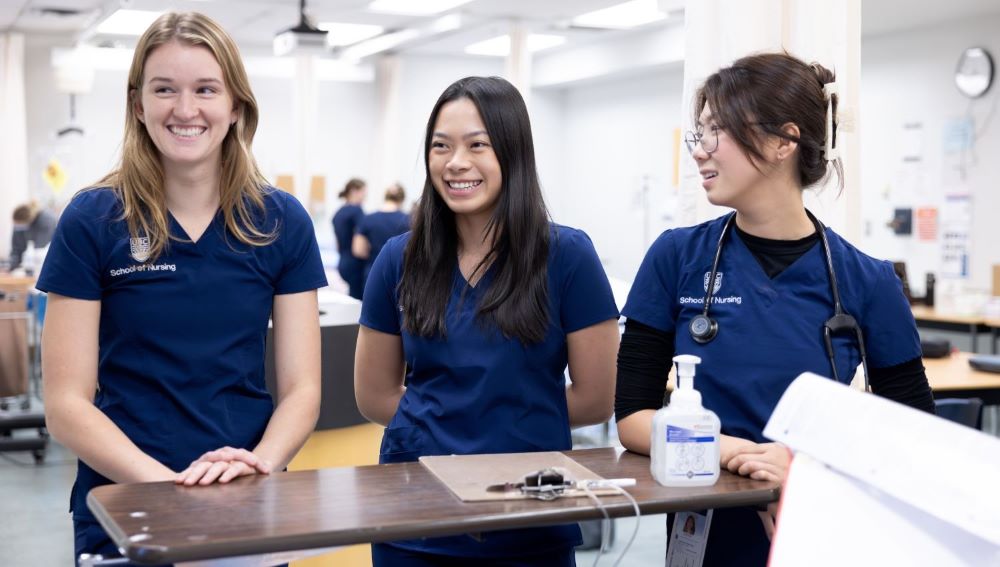
The WNRCASN conference will take place May 22 to 23—with preconference workshops on May 21—at the UBC Okanagan campus in Kelowna, British Columbia. The theme of the conference, “Driving innovation in nursing education,” encompasses a number of subthemes, though this list is not exhaustive:
- Teaching practices for fostering health equity
- Teaching and learning environments for enhancing EDI in nursing education
- Embracing new technologies in nursing education
- Planetary health and sustainability
- Learning pathways to Indigenous health nursing
- Building capacity in nursing education
Featured Speakers
We are excited to have speakers share their expertise from across the WNRCASN region, including from the University of Calgary, University of Lethbridge, University of Regina, University of Manitoba, and University of British Columbia.
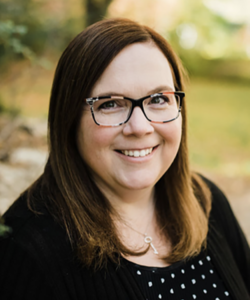 Tracie Risling
Tracie Risling
Tracie Risling, RN, PhD is the Associate Dean Innovation in the Faculty of Nursing at the University of Calgary, the President-Elect of the Canadian Nurses Association and the Past-President of the Canadian Nursing Informatics Association. With a practice background in pediatric nursing, Tracie has extensive experience in nursing education teaching, conducting research and engaging in curriculum design and evaluation for both undergraduate and graduate programs. She also leads a patient-oriented program of nursing informatics research including study on artificial intelligence, social media, co-design, and the use of texting for wellness and workforce support. She is a passionate advocate for increased nursing engagement in the development, use, and evaluation of digital health solutions, which is reflected in her work with the Doctor of Nursing program at the University of Calgary.
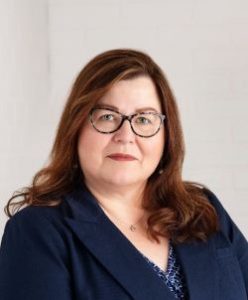 Cheryl Pollard
Cheryl Pollard
Dr. Cheryl Pollard, RN, RPN, PhD, ANEF, is an active scholar and researcher committed to the promotion of mental health and well being. Over her 35-year career in nursing, she has served in a wide range of academic and practice environments spanning large and small public and not-for profit organizations in Canada. She currently serves as Dean for the Faculty of Nursing at the University of Regina. The National League of Nursing has recognized Dr. Pollard’s enduring and substantial contributions to nursing education by inducting her as a Fellow into the Academy of Nursing Education. She is widely regarded as a thought leader and scholar in the areas of healthcare education, innovation, and leadership. As a professor, within the Faculty of Nursing, her passion for the scholarship of teaching and learning – specifically the impact of the relationships within the learning environment is bringing attention to the importance of being kind and compassionate to one another. She also had the honour of joining CASN’s Board of Directors in November 2023.
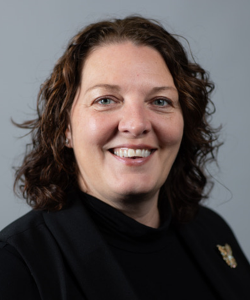 Nicole Harder
Nicole Harder
Nicole Harder, RN, PhD, is an Associate Professor and Associate Dean, Undergraduate Programs at the College of Nursing, University of Manitoba, Canada. She also holds an endowed professorship (Mindermar Professor in Human Simulation) at the Rady Faculty of Health Sciences at the University of Manitoba. In this role and with her team, she has launched an interprofessional virtual reality program called the ‘RadyVerse’. This virtual reality program spans 10 health professions programs, and 3 geographically separate campuses, and was the 2024 recipient of the Sim Innovator award from Simulation Canada.
Dr. Harder is an Editor Emeriti for Clinical Simulation in Nursing, and a curriculum developer and facilitator for the Canadian Association for Schools of Nursing in the Simulation Nurse Educator certification program. Nicole’s research focuses on learner outcomes linked to facilitation and debriefing techniques in simulation, with her most recent work on the use of virtual reality to develop socio-emotive skills.
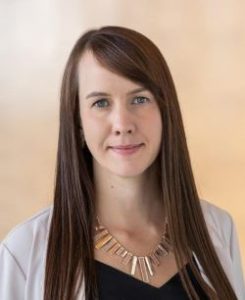 Laura Vogelsang
Laura Vogelsang
Dr. Laura Vogelsang RN, PhD, CCNE, CCCI, CMSN(C) is an Assistant Professor at the University of Lethbridge. Dr. Vogelsang’s program of research is within the area of digital health technologies including artificial intelligence and extended reality. Her doctoral work explored the use of virtual reality as a teaching strategy for managing aggressive behaviors in older adults with dementia. Most recently, she was awarded the Canadian Association of Schools of Nursing Pat Griffin Research Grant to explore how nursing students and nurse educators are being impacted by the recent release of the artificial intelligence Chat Generative Pretrained Transformer (ChatGPT). Dr. Vogelsang has the privilege of delivering the newly developed ‘Praxis in the Digital Age’ course which is one of the only courses of its kind offered to undergraduate nursing student in Canada. Laura strives to maintain a student-centered strengths-based approach to her research and teaching, and role model an appreciative inquiry approach to new technologies for students and her nursing colleagues.
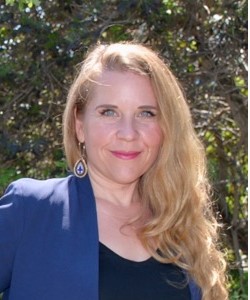 Katrina Plamondon
Katrina Plamondon
Katrina Plamondon (she/her) is an assistant professor, Michael Smith Health Research BC scholar, and co-director of the Equity Science Lab in the Faculty of Health & Social Development at the University of British Columbia Okanagan, located on the traditional and unceded territory of the Syilx People. As woman of Cree and Irish-German-French settler ancestry, and a Registered Nurse with more than 20 years combined of practice and health systems leadership experience, she grounds her work as an equity scholar in critical anti-oppressive pedagogy and relational approaches. In Canada, she plays a national leadership role in advancing health equity. Her program of research aims to overcome inertia in reducing health inequities and promote equity across social ecosystems. The Equity Science Lab is grounded in the belief that everyone deserves to live with dignity, across all social and geographic locations. Her work is intentionally relational and service-orientated, aiming to cultivate a supportive and collaborative learning environment focused on leveraging resources and evidence to spark equitable futures.
1300-1330
Registration
1330-1630
Pre-conference Workshops
0730-0830
Continental Breakfast and Registration
0830-0900
Welcome—Conference Chair Dr. Lise Olsen
Land Acknowledgements
Opening Remarks from UBCO and TRU
0900-1000
Keynote Address—Schools of Nursing and Nurse Educators as Change Agents and Innovators
Dr. Tracie Risling, Associate Dean, Innovation, Faculty of Nursing, University of Calgary; President of the Canadian Nurses Association and the Past-President of the Canadian Nursing Informatics Association.
1000-1030
Refreshment/movement break
1030-1205
Concurrent Sessions
1205-1315
Lunch
1315-1500
Concurrent Sessions
1500-1630
Poster presentations/ Reception
Evening activities
0800-0900
WRNCASN Annual Meeting / Continental Breakfast
0900-1015
Concurrent Sessions
10:15-10:45
Refreshment/movement break
10:45-12:15
Plenary Panel—What’s next? Opportunities to transform learning experiences and enhance the preparation of future nurses
- What’s next? Opportunities for preparing equity-minded nurses—Dr. Katrina Plamondon, Assistant Professor and MSHR-BC Scholar, School of Nursing, UBC Okanagan
- What’s Next? Opportunities for integrating Indigenous knowledge into nursing education— Dr. Cheryl Pollard, Dean, Faculty of Nursing, University of Regina
- What’s Next? Opportunities for innovations in simulation in nursing education—
Dr. Nicole Harder, Associate Dean, UG programs and Professor, College of Nursing, University of Manitoba and Mindermar Professor in Human Simulation, Rady Faculty of Health Sciences.
- What’s Next? Opportunities for preparing nurses for working in digital environments (the future of healthcare is mobile/virtual nursing)—Dr. Laura Vogelsang, Assistant Professor (Nursing), Faculty of Health Sciences, University of Lethbridge
12:15-12:30
Special Announcement
Closing Remarks
Afternoon activities
More information on the Preconference Workshop will be available soon.
Preconference workshops will be scheduled on May 21, 1:30 pm to 4:30 pm.
These 90-minute sessions will equip attendees with practical skills, enhance their knowledge, and improve their teaching practices in nursing education.
Workshops will be scheduled during the concurrent sessions.
Check back here for Workshop topics soon!
- Presentation Length
- Duration: 10–15 minutes, followed by 5 minutes for Q&A. Total time must not exceed 20 min. Session moderators will hold presenters to allotted time.
- Technical Considerations
- Bring your presentation on a USB drive and email yourself a backup.
- Use common formats (e.g., PowerPoint or PDF).
- Computers will be provided with the latest version of Windows 11 and Office 365.
- Clickers will also be provided (unless you prefer to bring your own).
- Check in early to test equipment and compatibility.
- Presenters will be designated a room according to the schedule. Please upload your presentation onto the computer in the designated room prior to the start of your session.
Tips for Oral Presentations
- Slide Design
- Number of Slides: Aim for 1 slide per minute (10–12 slides for a 10-minute talk).
- Format: Minimum 24 pt font for readability. We recommend that you build or convert your presentation to widescreen format 16:9.
- Speaking Tips
- Engage the Audience: Use storytelling, questions, or real-world examples.
- Speak Clearly: Avoid jargon and maintain a moderate pace.
- Practice Timing: Stick to the allotted time. Know what to omit if you start to go over your allotted time.
- Poster Size and Layout
- Each poster presentation is provided one poster board.
- Suggested poster size is 48″ wide x 36″ tall (4ft x 3ft) in landscape (horizontal) format. Posters may not extend outside the assigned designated poster board space.
- Poster Setup
- Posters will be displayed in the University Centre, Room 200.
- Posters should be placed on the poster boards on Thursday, May 22 between 8 am and 1:00 pm. Posters must be placed in designated spaces.
- A list of posters and their location in the display area will be available at the entrance to the Room 200.
- Push-pins will be available to secure posters.
- Poster Session
This session will be held May 22, 3-4:30 PM. The presenting author(s) is expected to be present at their poster during the poster session.
- Poster Takedown
Posters must be removed at the end of the poster session between 4:30-5:00 PM. Any posters not removed by 5 PM will be held at the registration desk for pick-up.
Tips for Designing Effective Posters
- Prepare a heading at the top of the poster indicating the abstract title, authors and affiliations.
- Arrange materials in columns and use white space to help direct readers logically through the poster.
- Posters should be self-explanatory but not comprehensive. Presenters will supplement and elaborate on the research/scholarly project during conversations with other attendees.
- Text should be clear, to the point and easy to read from 8-10 feet away.
- Use bullets, numbering, and headlines.
- Example font sizes include:
- Title: 72–100 pt
- Headings: 36–48 pt
- Body Text: 24–36 pt
- Captions/References: Minimum 18 pt
- Incorporate clear visuals (graphs, charts, images) that support the text.
Please note that submitting an abstract does not mean you are registered for the 2025 WNRCASN Conference. Conference registration is a separate process that is required for all presenters.
Registration fees of the presenting author must be paid by March 31, 2025 at the latest to secure the presentation during the conference.
Registration
Please note: WNRCASN members receive a discounted registration. Visit WNRCASN membership to a purchase your membership. Active Members and Active Undergraduate Student Members also have full voting privileges at the Annual General Meeting (AGM) and online voting throughout the year.
- WNRCASN active members: $375
- Non-members: $425
- Associate WNRCASN member (former full or part-time faculty members): $395
- Active undergraduate student members: $190
- Students (undergraduate or graduate, part or full-time): $200
- WNRCASN active members: $425
- Non-members: $475
- Associate WNRCASN member (former full or part-time faculty members): $445
- Active undergraduate student members: $240
- Students (undergraduate or graduate, part or full-time): $250
Registration Deadline is May 5 2025.
Venue and accommodations
The conference is located on the UBC Okanagan campus in the heart of British Columbia’s beautiful Okanagan valley.
On-Campus Accommodations
You may book on-campus accommodation at WNRCASN Conference special rate before April 15, 2025. You may adjust the default date range as you wish and your credit card won’t be charged until you check in. Watch the video to see the types of accommodation and amenities available.
Off-Campus Accommodations
Four Points by Sheraton Kelowna Airport (1.6 km from UBCO, 22 minute walk).
Hampton Inn & Suites by Hilton, Kelowna Airport (1.6 km, 21 min walk)
Contact Us
Questions about the conference? Contact us at WNRCASN.2025@ubc.ca
